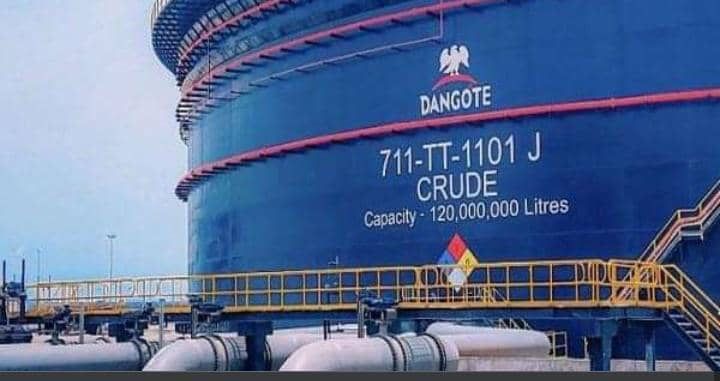
The Dangote Petroleum Refinery has successfully received its first four cargoes of crude oil from the Nigerian National Petroleum Company Limited (NNPCL) as part of a new naira-for-crude sale agreement.
This development was confirmed by both refinery officials and government representatives on Tuesday. The shipments were delivered over the past three weeks, marking the commencement of a program that allows local refineries to purchase crude oil in Nigerian currency.
Informed sources indicated that the refinery is poised to receive additional cargoes soon, reflecting a growing confidence in the viability of this initiative. The agreement is particularly significant, as the Dangote refinery is currently the only operational petrol-producing facility in Nigeria, with a capacity of 650,000 barrels per day.
The first phase of this naira-crude sale agreement is set to last for six months, with a possibility of renewal by the federal government. However, specifics regarding the cost per barrel of crude oil remain undisclosed. A senior official from the refinery noted, “The naira-for-crude deal has started, and we are still expecting more. This first phase will last for six months, and we do not yet know what will happen after that.”
Previously, the Dangote refinery faced substantial challenges in securing crude oil supplies as it began operations, leading to concerns from Alhaji Aliko Dangote, President of the Dangote Group. He alleged that some international oil companies (IOCs) were attempting to sabotage the refinery’s operations by refusing to supply crude directly. Instead, these companies insisted on selling through foreign agents, often at inflated prices.
The situation prompted the Nigerian government, under President Bola Tinubu, to propose the naira-based crude sales to local refineries.
The Federal Executive Council (FEC) approved this initiative, allowing for a monthly supply of approximately 385,000 barrels of crude to the Dangote refinery, translating to about 11.5 million barrels each month. The refined products such as petrol and dieselwill also be sold in naira.
In response to the development, the Independent Petroleum Marketers Association of Nigeria (IPMAN) expressed optimism about the supply of crude to the Dangote refinery, believing it would help alleviate shortages experienced by the Nigerian National Petroleum Company (NNPC) and other marketers. Chinedu Ukadike, IPMAN’s National Publicity Secretary, stated, “Allowing Dangote to access enough crude will ensure that PMS and other by-products will be adequate, addressing previous complaints of supply shortfalls.”
However, the refinery’s operational challenges have not been fully resolved. Although the Dangote refinery has ramped up production, reports indicate that it has only managed to supply 317 million liters of the 1.065 billion liters it requested recently. Still, with about 245 million liters stored in its tanks, it aims for a daily production target of 30 million liters.
Despite the optimistic outlook, concerns remain regarding the refinery’s ability to meet the high domestic demand for refined products. Analysts note that Nigeria has historically relied on imports to satisfy its fuel needs, importing around 200,000 to 300,000 barrels per day.
The drop in petrol shipments observed in early October suggests that the Dangote refinery’s production capabilities may not yet be sufficient to fully replace these imports.
As the naira-for-crude agreement unfolds, stakeholders are closely watching its impact on the local market and the broader petroleum industry.
The success of this initiative could pave the way for greater domestic refining capacity and reduced dependency on imported fuel, ultimately benefiting the Nigerian economy.





